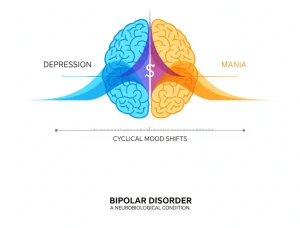Overview
Bipolar disorder is a long-term mental health condition characterized by significant changes in mood, energy levels, activity, and ability to function. These mood changes range from emotional highs, known as manic or hypomanic episodes, to emotional lows, known as depressive episodes. The shifts in mood are more intense than normal mood variations and can affect daily life, relationships, and work.
Bipolar disorder can occur at any age, though it often begins in late adolescence or early adulthood. With proper treatment and ongoing support, many people with bipolar disorder are able to manage their symptoms effectively.
Symptoms
Symptoms of bipolar disorder vary depending on the type and severity of mood episodes.
Symptoms of manic or hypomanic episodes may include:
-
Increased energy or activity levels
-
Elevated, irritable, or unusually optimistic mood
-
Decreased need for sleep
-
Rapid speech or racing thoughts
-
Poor judgment or impulsive behavior
-
Difficulty concentrating
Symptoms of depressive episodes may include:
-
Persistent sadness or emptiness
-
Loss of interest in activities once enjoyed
-
Fatigue or low energy
-
Changes in appetite or weight
-
Sleep disturbances
-
Feelings of worthlessness or guilt
-
Difficulty thinking or making decisions
Some individuals may also experience mixed episodes, where symptoms of mania and depression occur together.
Causes
The exact cause of bipolar disorder is not fully understood. It is believed to result from a combination of biological, genetic, and environmental factors.
Possible contributing causes include:
-
Imbalances in brain chemicals involved in mood regulation
-
Genetic factors, as the condition often runs in families
-
Changes in brain structure or function
-
Stressful life events or trauma that may trigger episodes
No single cause is responsible for the condition.
Risk factors
Certain factors increase the likelihood of developing bipolar disorder.
Risk factors include:
-
Family history of bipolar disorder or other mood disorders
-
High levels of stress
-
Substance misuse
-
Major life changes or traumatic experiences
-
Certain medical conditions affecting brain health
The presence of risk factors does not guarantee the development of the disorder.
Complications
If untreated or poorly managed, bipolar disorder can lead to serious complications.
Possible complications include:
-
Problems with relationships and social functioning
-
Poor work or academic performance
-
Financial or legal difficulties due to impulsive behavior
-
Substance use disorders
-
Increased risk of self-harm or suicide
-
Reduced overall quality of life
Early diagnosis and consistent treatment help reduce these risks.
Prevention
There is no guaranteed way to prevent bipolar disorder, but early intervention and ongoing management can reduce the frequency and severity of mood episodes.
Helpful preventive strategies include:
-
Following prescribed treatment plans consistently
-
Recognizing early warning signs of mood changes
-
Maintaining regular sleep and daily routines
-
Managing stress through healthy coping techniques
-
Avoiding alcohol and recreational drugs
-
Seeking support from mental health professionals and support networks
Long-term management plays a key role in maintaining stability and improving outcomes for individuals with bipolar disorder.
Advertisement

